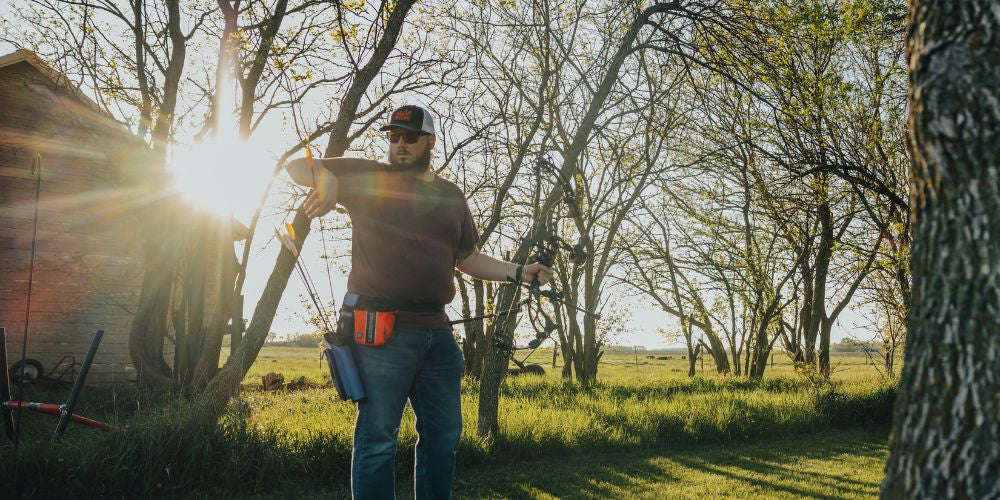Have you ever had that moment in a competition or at your local club where you just think, “I feel like I’ve met this person before?” Well, it could actually just be that you’ve met people like them before. I will break down the top five “archery stereotypes” and how best to handle them.
- The Overcorrective Shooter

(photo credit: GettyImages)
This tends to be the shooter that will throw their bow arm in, quite literally, every direction to get their arrow in the middle after release. It has been proven that our bodies, no matter how fast we think we are, react slower than what we think. So even though you might think you helped that arrow into the middle, it technically didn’t help. About 98% of the time it’s just a reflex our bodies do to try to correct something we felt at the very last second.
Now this person can be a little dramatic in their follow through. Maybe even give some huffs and puffs here and there. The key to not letting it bug you is to try and ignore it the best you can. If they ask you to spot and see where their arrow landed, tell them what they want to hear. Then if it happens to be out, just let them know how much that bow arm must not have helped on that shot. Help them reinforce it as a negative thing to throw their bow arm all the time. This can usually bring the throwing from 100% of the time to about 60% of the time. Trust me, it’s an improvement!
- The coaching parent

(Photo credit: Chris Bee)
Many, many, many times we have all spotted the parent who tends to be a little more involved than their child. In the case with archery, the parent has no archery experience themselves and still tries to coach their own kid in a tournament setting. They want so badly to have their “little Johnny or little Susie” be an all-star athlete that they forget to be a parent. They are usually spotted right behind their child, or as close as they can get, with a pair of binoculars or scope glued to their eyeballs.
Leave the coaching to the coach. The best thing a parent can do for their child is five simple words, “I love watching you play.” They want you to be supportive and proud, not angry for the one arrow they messed up.
- The Know-It-All

You guessed it. This is the shooter that likes to tell you everything you are doing wrong. Whether you want their advice or not. This can range from form technique, to course analysis, to what that person ate that morning. They will find anything and everything to talk about to sound like they know everything about the sport.
The easiest way to deal with this type of shooter is to simply nod. Now unless they say something that you have definitely experienced yourself and can correct them for, don’t try to engage. It will only make you more frustrated as an archer and not want to keep shooting that day. This archer type will stick to their guns and not like to be corrected, so it is best to leave them to their own devices unless truly proven otherwise.
- The equipment blamer

There are shots we make that we all question, “Why did that go there?” This stereotype heavily relies on blaming their equipment for practically everything. It never seems to be their fault. Whether it’s during scoring or just practice, all bad shots are never owned up to. We all understand that in general we will have flier shots that we are curious about. This person takes it to a different level.
The nicest way you can handle this situation is by just asking them to explain why it is that piece of equipment that is the problem. Most of the time, they won’t be able to answer the question. Since, quite frankly, it is just an excuse. If you know basic form techniques well enough, you can then suggest to them a similar problem that happened to you and what you did to fix it. Without the reasoning of, “well it’s just my bow.” Hopefully it will get through to them and they will be less likely to keep putting their equipment to fault.
- The “back in my day” Pro

The archer who just likes to reminisce about the “good old days” of shooting. In regards to age, it is expected of an older generation to do this. We are focusing more on those that are nostalgic of something only 10-15 years ago. This can make it a little frustrating when you might have also shot through the same struggles or tournaments that this person is talking about. Their stories seem to stretch on for days with no end in sight. By the time they finish, you just want to high tail it out of there. The thing about the past is…it’s the past. They just want to perpetually live in a place that no longer exists.
For this one, patience is your best friend. Just waiting them out with smiles and nods can be the best thing. Another trick is if you are with a friend or know someone else who is also a chatty-cathy about the past, you can sneak them into the conversation as you try to leave it. That way, both of them can talk about what they want to and you can be free.
Hope this inspires you to think about other stereotypes you’ve seen on the range and maybe ask your friends to admit to their own stereotype. For a fun video version of Archer Stereotypes, check out Emily and Chris Bee's two segments on youtube!
 cust@legendarchery.com
cust@legendarchery.com 302 503 5767
302 503 5767 Sauk Village IL 60411
Sauk Village IL 60411


